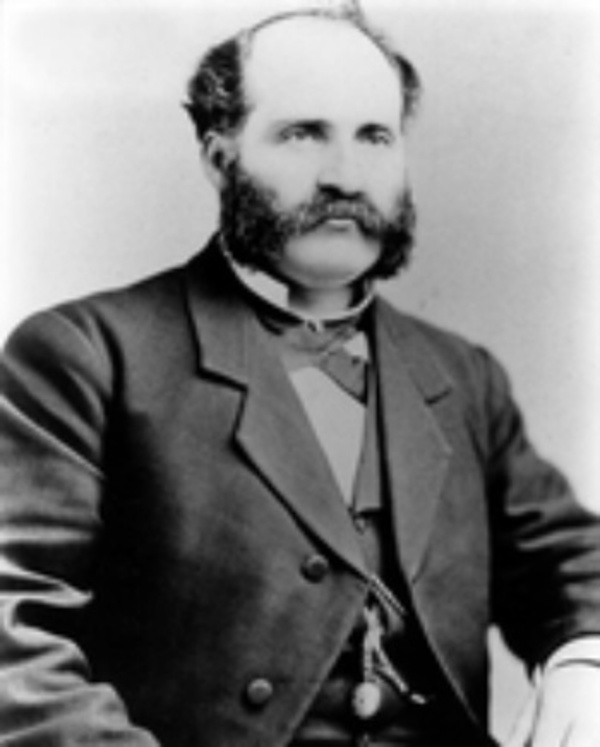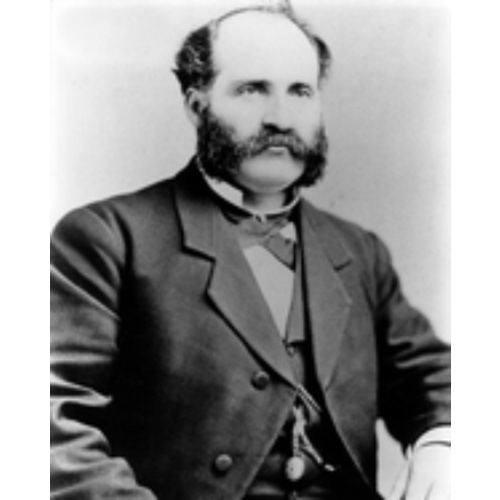
Source: Link
CABANA, HUBERT-CHARRON (baptized Hubert Charon, but known as Hubert Charron, dit Cabana; he signed H. C. Cabana), lawyer, journalist, politician, and office holder; b. 14 June 1838 in Verchères, Lower Canada, son of Lambert Charon (Charron, dit Cabana), a farmer, and Marie-Louise Anphil (Handheld, Enfield); m. 13 Aug. 1866 Mary Esther (Marietta) Carr in Compton, Lower Canada, and they had five children; d. 9 June 1901 in Sherbrooke, Que., and was buried there 12 June in Saint-Michel cemetery.
Young Hubert-Charron Cabana did the classical program at the Collège de L’Assomption, and then began the study of law at Quebec in 1858, completing it in 1862. He had moved to Sherbrooke in 1861, and in that year and the next he taught for a few months at the Collège Commercial de Sherbrooke, the forerunner of the Séminaire Saint-Charles-Borromée. Called to the bar on 7 Oct. 1862, he was one of the first French Canadian lawyers in the city. For 23 years, until he was appointed protonotary, he practised his profession there, first in the law office of Cabana et Chicoyne, then in Cabana et Bélanger, and after July 1874 by himself. He was appointed consulting counsel on 26 June 1883 and elected bâtonnier of Saint-François district in May 1884. After obtaining a master’s degree in law from Bishop’s College in Lennoxville on 30 Oct. 1880, he is thought to have taught civil law there until 1888.
Along with his legal career, Cabana was involved in journalism. On 13 Oct. 1866 he and his law partner Louis-Charles Bélanger founded the city’s first French-language newspaper, Le Pionnier de Sherbrooke. From its initial issue, the paper advocated unity among the different nationalities making up the population of the Eastern Townships. In July 1874, however, as a result of friction and differences of opinion between the two, Bélanger left Le Pionnier and started a rival publication, Le Progrès de l’Est. This quarrel, which led to bitter polemics, continued for some 15 years. Differences none the less seem to have diminished in the course of time since the two men came together again when the two French-language papers merged in 1878. The necessity of combining them had become evident during discussions at a reception to celebrate Cabana’s election to the municipal council. The merger was required largely for economic reasons, the market being too small to support two French-language papers, but probably also for political reasons: both papers were of the Conservative persuasion and their differences, mainly in matters of local politics, threatened to divide the party. In February 1878 the Compagnie Typographique des Cantons de l’Est, which had 24 employees, was founded to pursue “publication of a French Conservative newspaper in the city of Sherbrooke.” The new firm, with a capital of $10,000, would buy the two papers and publish a single one under the name of Le Pionnier de Sherbrooke. Cabana sold his journal for $3,800. He was president of the company until 1885 and continued as editor of the paper until June 1881. Even after leaving it he continued his association as a member of the board of directors.
Cabana took an active part in the municipal life of Sherbrooke. He had first been elected as councillor for Centre Ward, which he represented from 10 Jan. 1876 until 17 Jan. 1880 and from 21 Jan. 1881 until 19 Jan. 1885. Between these two terms, he was elected mayor by a unanimous vote of the council on 17 Jan. 1880. Cabana, who was accustomed to being first, thus became the first French-speaking mayor of this very loyalist city in the Eastern Townships, where the English-speaking population was in the majority. For Le Pionnier, the election was significant: “All the educated and intelligent people who come in contact with us immediately lose their prejudices, which are based on nothing but ignorance about our race.” Under his guidance, Sherbrooke developed considerably, with the installation of water, gas, and the first telephone line. On 21 Jan. 1881 Cabana was defeated for the mayoralty by a vote of three to two. On 19 Jan. 1885 he was re-elected, an event that Le Pionnier hailed as a great victory for the French-speaking element in the city. During this term the Waterloo and Magog Railway linking Montreal with New York was run through Sherbrooke. When on 9 Sept. 1885 Cabana was appointed Superior Court protonotary, clerk of the Circuit Court, and clerk of the crown and of the peace for the Saint-François district, he resigned from the mayoralty. He would serve as protonotary for the rest of his life.
Cabana was active in a number of local organizations as well. For 36 years he was a member of the Board of Roman Catholic School Commissioners and several times he was its chairman. On coming to Sherbrooke, he had joined the Société Saint-Jean-Baptiste, and he served three terms as its president, in 1871–72, 1878, and 1892. He was also a director of two cultural institutions, the Morey Art Building and Library, and the Free Reading Room; a founding member and first president of the Union Saint-Joseph des Artisans de Sherbrooke, a mutual aid society established in 1874; and secretary of the Club Cartier, a Conservative political organization.
Hubert-Charron Cabana died in Sherbrooke on 9 June 1901, a few days before his 63rd birthday. His funeral was held three days later. The comments made at the time of his death were laudatory; he was not known to have had any enemies. As one of the first French Canadian lawyers in Sherbrooke, the founder of the city’s first French-language newspaper, and its first francophone mayor, Cabana made a significant contribution throughout his career to the advancement of the French-speaking population of the Eastern Townships.
AC, Saint-François (Sherbrooke, Qué.), État civil, Catholiques, Saint-Michel (Sherbrooke), 12 juin 1901; Minutiers, J.-A. Archambault, 27 avril 1878. ANQ-M, CE1-26, 15 juin 1838. Le Pionnier (Montréal), 16 juin 1901. Le Pionnier de Sherbrooke, 13 oct. 1866; 24 juill. 1874; 23 janv. 1880; 22 janv., 17 oct. 1885. Le Progrès de l’Est (Sherbrooke), 11, 14 juin 1901. “Cent ans déjà que . . . ,” BRH, 68 (1966): 141. Dominion annual reg., 1880–81, 1883, 1885. Amédée Gaudreault, Les maires de Sherbrooke (Sherbrooke, 1954). J. Hamelin et al., La presse québécoise. J.-P. Kesteman, “Le Progrès” (1874–1878): étude d’un journal de Sherbrooke (Sherbrooke, 1979). Les maires de Sherbrooke, 1852–1982 (Sherbrooke, 1983). Terrill, Chronology of Montreal.
Cite This Article
Jocelyn Saint-Pierre, “CABANA, HUBERT-CHARRON (baptized Hubert Charon) (Hubert Charron, dit Cabana; H. C. Cabana),” in Dictionary of Canadian Biography, vol. 13, University of Toronto/Université Laval, 2003–, accessed November 28, 2024, http://www.biographi.ca/en/bio/cabana_hubert_charron_13E.html.
The citation above shows the format for footnotes and endnotes according to the Chicago manual of style (16th edition). Information to be used in other citation formats:
| Permalink: | http://www.biographi.ca/en/bio/cabana_hubert_charron_13E.html |
| Author of Article: | Jocelyn Saint-Pierre |
| Title of Article: | CABANA, HUBERT-CHARRON (baptized Hubert Charon) (Hubert Charron, dit Cabana; H. C. Cabana) |
| Publication Name: | Dictionary of Canadian Biography, vol. 13 |
| Publisher: | University of Toronto/Université Laval |
| Year of publication: | 1994 |
| Year of revision: | 1994 |
| Access Date: | November 28, 2024 |



